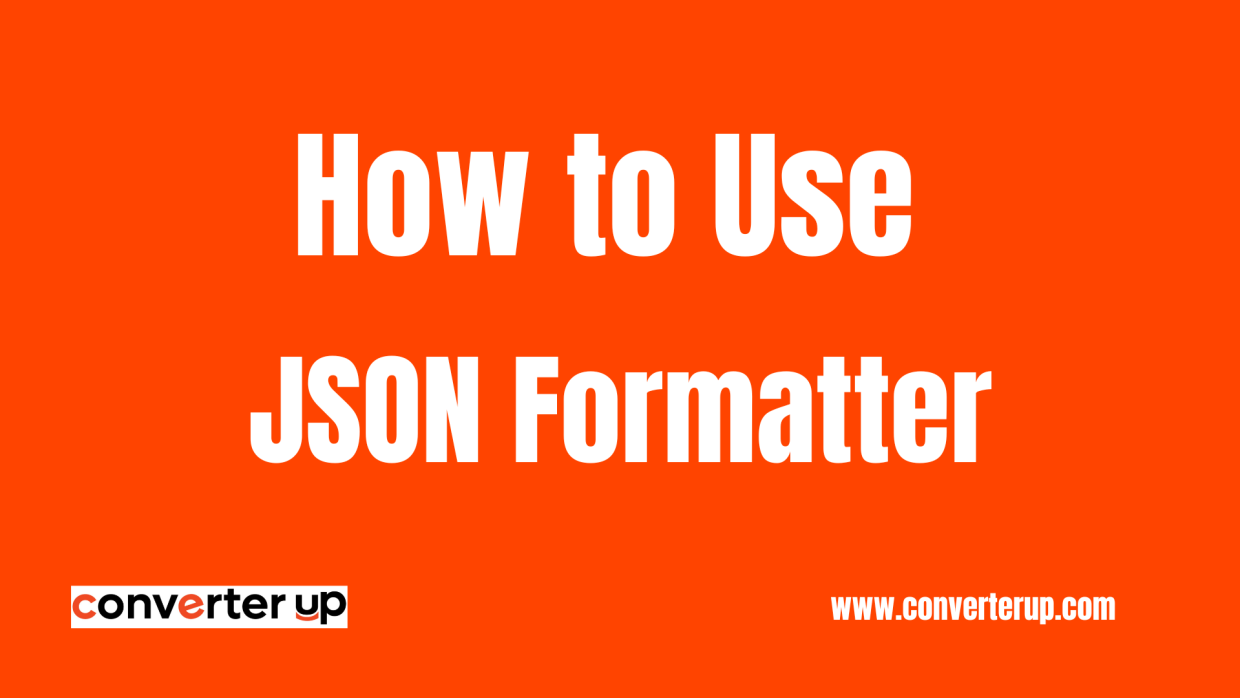
How to Use JSON Minify Tool
Table of Contents
Introduction
Did you ever wonder why your website or application becomes slow when working with large data? If your site uses JSON (JavaScript Object Notation) to transmit data, likely you have experienced slower load times and performance issues. One solution is to use a JSON Minify tool.
Think of it as cleaning up your closet. JSON Minify simplifies the code by removing unnecessary characters, making the transmission more efficient. How does it work? And more importantly, how can you start leveraging the usefulness of a JSON minify tool like ConverterUp’s? In this article we’re going to take a closer look at what we call ’JSON minification’ in hopes you’ll better understand its benefits and how using our converter can help improve your web transmission.
What is JSON Minification?
JSON Minification is the practice of reducing the size (in bytes) of a JSON file by removing unnecessary or redundant data without affecting the file's functionality. Data such as whitespace characters, newline characters, and comments are only really there to make the JSON document more readable for humans and are completely ignored by applications using this data.
Think of it as cleaning your desk—you need the essentials, but you can remove the extra clutter to make things more efficient. JSON is similar; JSON minification removes the extra clutter and makes it faster in terms of data transfer and processing.
Why should you use JSON Minify?
There are a number of benefits that can be obtained when using JSON Minify, especially when working with large datasets. Here’s why you might want to consider minifying your JSON data:
- Improved Load Times: Minified files are smaller, which means that they will load into memory faster. When your website or application is using JSON data to render part of the content, you want this to happen as fast as possible.
- Reduced Bandwidth Usage: Smaller file size generally leads to less data being transferred from server to client. This not only saves bandwidth for the server (if downloaded millions of times would easily add up), but also for the user.
- Better User Experience: Faster loading and data retrieval result in noticeable navigation improvements, so in general, happier users.
- SEO Benefits: Fast websites make google happy. JSON Minify can do that for you, so you rank higher.
How Does JSON Minify Work?
The JSON Minify process is simple. What it does is remove the required element in the JSON file that would be used in processing; these are like.
- Whitespace: Spaces are not significant in between keys and values or in between items of data.
- Line Breaks: Any extra line breaks that appear in the file simply to make it easier to read for humans are also removed.
- comments: Comments are being treated as part of documentation and hence not necessary for the machine.
Using JSON Minify, we can see that the file size has reduced significantly but is still able to hold the same information needed to keep functionality intact.
Some of the key advantages of using JSON Minify.
- Faster Website Load Time: A Smaller JSON file and less time to load equal a better experience for your app or website users.
- Smaller File Size: It’s easier to manage and store; it also helps to reduce your server or database size if you’re using JSON files for storage.
- Optimized for Mobile: Especially useful for mobile where internet connections might be slow or data plans limit the file size that needs to be loaded.
- Increased Efficiency: Less data to deal with, your website/application is faster. Especially if you are dealing with large datasets.
How to Minify JSON with ConverterUp’s Tool
It is very easy to use our JSON Minify tool in ConverterUp. Here are the steps you need to follow:
Step 1: Go to the ConverterUp JSON Minifier page.
Step 2: Paste your JSON data in the given text box.

Step 3: Click on the “Minify” button.

Step 4: Minified JSON file and Copy the Code.

Best Practices for JSON Minification
Follow below best practices to get more out of JSON Minify.
- Before you deploy it make sure to test: Before using the minified JSON file to your live website or application, always tests whether its working as expected.
- Minify after development: Minify the JSON file after you're done with everything. You really don't want to continuously re-minify during development.
- Apply Compression with Minification: For reducing the size of minified JSON files even more (thus making them load faster) you can compress them by using gzip or Brotli.
JSON Minification and Mobile Optimization
The mobile users usually have a slower connection than desktop users. When your JSON files are minified, that frees you up more bandwith so mobile users have to wait for less data do transfer before the content and thus having a faster connection speed; this is important as mobile people are impatient.
FAQs
1. What is JSON Minification?
JSON Minification is a means to remove the extra characters from a JSON file so as to reduce its size and make it load faster.
2. Why should I use a JSON Minifier?
Using a JSON Minifier increases website speed, reduces server load, and improves SEO rankings by making your website load faster.
3. Is JSON Minification safe for my website?
Yes, it is. JSON Minification just removes non-essential characters from your JSON file and doesn't change the way it works.
4. How to use ConverterUp's JSON Minifier tool?
Just copy or paste your JSON code in the provided box and hit the "Minify" button immediately you will get the output below the input box where you can see your minified code and click on the "Download" button to download it.
5. Can I automate the JSON Minification process?
Yes, you can do that with build tools like Gulp or Webpack or something like that to automate minifying your JSON files in the development process.










